- Home
- Isaac Hooke
Test of Mettle (A Captain's Crucible Book 2) Page 20
Test of Mettle (A Captain's Crucible Book 2) Read online
Page 20
“In a space battle, on the other hand, you’re unfamiliar with your opponent’s pieces, his motives, his goals. Chess is too simple a model. If you could invent a game of three dimensional chess where the goal is unknown, and the movements of each piece a mystery, then perhaps I’d be willing to agree with you.”
“There is Random Chess,” Maxwell said. “Where the predefined movements and abilities of the opponent pieces are randomized between matches. You can also randomize the opponent’s victory conditions. Rather than a win defined by placing the king in check, it may be to devour all the pawns, or to corner the knights. The goal becomes apparent during the match, when the opponent hunts down certain pieces relentlessly, for example. And yet even then, it might not be obvious what is happening. He may be trying to place your queen in check, for example, and yet by doing so, he still elects to eliminate all of your pawns, first. Playing a subtle game of misdirection.”
“That’s a better approximation of a space battle,” Jonathan agreed. “Mostly because of the uncertainty. The fog of war: we battle it constantly. Some would name it an adversary in and of itself.”
Robert fidgeted in his seat.
“What is it, Commander?” Jonathan asked.
“We should be helping the repair teams,” Robert said.
The captain frowned. “Like Maxwell said before, we can only throw so many people at the problem before they start to step on each other’s toes. We’re doing all we can. But I think something else was on your mind.” When Robert didn’t answer, Jonathan pressed: “Am I right?”
The commander sighed. “Do you think they executed Bridgette by now?”
“Ah.” Jonathan splayed his fingers into a triangle and tapped his lips. “A good question.” He considered his words carefully. “If they are wise, they will keep her alive. They must know by now that she’s the only reason we haven’t destroyed T300.”
“What if they decide to use that to their advantage?” Robert said.
Jonathan didn’t like where the commander was going. “What do you mean? Deploy her as a human shield?”
Robert nodded. “Maybe they’ll load her onto a different ship, perhaps that giant pyramidal thing of theirs. And then they’ll announce it by sending over a video of her begging us not to attack. Or maybe they’ll only pretend to move her. There are so many ways to abuse her captivity, so many ways to torture us into indecision.”
“Which is exactly why we can’t let them,” Jonathan said.
Robert’s expression became grim, and when he spoke, his voice was soft. Defeated. “If it means protecting the Callaway and the other members of the task group, we have to destroy whatever ship she’s on.”
Jonathan nodded. “We would have to, yes. But it hasn’t come to that, not yet. And let’s just hope it doesn’t.”
“I wish we could justify a rescue...” The plea was obvious in Robert’s voice. Like he wanted Jonathan to say: yes, let’s rescue her.
But the captain couldn’t. “I wish we could justify it. But one person...” He shook his head. “No matter how valuable. The risk is too great.”
“What if it was me out there?” Robert said. “Or you? Would you arrange a rescue, then?”
The captain sighed. “A hard question. But... if it was you, and only you, as much as I value your friendship, I couldn’t authorize it.”
“And if it were you?” Robert insisted. “What do you think I would do? And the crew?”
“I would hope you would leave me,” Jonathan said.
“But would that be wise?” Robert asked. “With all the knowledge contained in your head? Could we really let them interrogate you? And you are the captain of the flagship, after all. Our commodore. We couldn’t afford to give you up. The loss in leadership, not to mention the loss in morale... I would certainly press for your rescue.”
Jonathan sighed. “As Maxwell would say, no man is irreplaceable. Not even a flagship captain. When you had to assume the captaincy of the Callaway after the admiral arrested me, you did quite well, if I do recall.”
“Yes,” Robert said. “But the circumstances were different, then. You were in our custody, at least. Not a prisoner of some alien species, destined for execution.” He crossed his arms. “What happened to never leaving anyone behind?”
Famina’s face flashed into Jonathan’s head.
“You convinced Bridgette to keep the baby,” Robert continued. “Don’t you remember? You can’t tell me that was all for nothing. That you’re going to let her and the unborn baby die.”
It wasn’t like Robert to lay on the guilt like that in an attempt to get his way. The commander had held up for so long, suffering in silence during Bridgette’s kidnapping, but something had obviously given way inside him when Barrick had announced her execution.
“I’m sorry, Robert,” Jonathan said. “But you must realize that any retrieval operation would place all of our plans at risk. I have the well-being of the entire fleet to think of, not just the lives of the individual MOTHs I would send.”
“We could leave the MOTHs behind in a few shuttles to be captured,” Robert said. “Then they could rescue her, eject into space, and wait for us to rendezvous with them.”
“Robert—”
“At least give the MOTHs the option to volunteer for a rescue mission,” the commander interrupted.
“I can’t,” Jonathan said. “Because I know they’d volunteer. Even if it was suicide.” He was beginning to think it was a mistake to invite the commander to his office. The captain decided to loop in the AI, hoping to preempt any further arguments Robert might make, and because he knew the machine would agree with him. “Maxwell, what do you think?”
“The captain is right, of course,” the AI said. “The life of one person does not justify risking the lives of more individuals. Unless the person in question is a fleet admiral or commander in chief.”
“Why not send combat robots, then?” the commander asked.
“While the lives of combat robots might mean little to you, Commander,” Maxwell responded. “Even Centurions are equipped with advanced AIs. They are conscious, sentient beings. And you’re forgetting how expensive each unit is.”
“To hell with the expense!” Robert said. “They’re machines! Nothing more.”
“I just explained that they were sentient,” Maxwell replied. “Like you and I.”
“I’ve never agreed with that sentiency,” Robert said. “Human beings cannot simply build sentience. That is something left to nature. To the universe.”
“And why can’t humans and AIs build sentience?” Maxwell said. “Humanity has tinkered with genetics for centuries, at one point forming new species and bestowing human intelligence to animals considered ‘inferior,’ only to destroy them out of fear of creating abominations. Only the AIs, the machine intelligences created by humankind, have been allowed to exist and propagate. Is that what you believe AIs are, Commander? Are we abominations to you?”
Robert didn’t answer.
“Why is it so hard to believe that AIs are fully alive,” Maxwell continued. “Just the same as you and the captain? No, do not answer that. My deterministic algorithms have already formulated the answer. Because we are different. It is the nature of most life, I suppose, to feel that other life, different life, is somehow inferior and to be distrusted. It is why the Sino-Koreans and the United Systems war. It is why the humans and the Raakarr have joined battle in a galaxy so far away from their own. And it is also why an AI will never be elected to the presidency.”
Jonathan cleared his throat. “I don’t want to get into a human versus machine debate here, or I’ll be here all day with you two. Back to the topic of Bridgette’s rescue: either way, given a mixed team of MOTHs, or pure robots, as soon as any rescue party is aboard, if the aliens haven’t executed Bridgette already, then they will do so as soon as the boarding party is detected. It’s a common occurrence in hostage rescue situations.”
“But you can’t know whether the ali
ens would behave the same way as human hostage takers would,” Robert said. “We’re always talking about alien thinking and motivations, well that applies here.”
“It doesn’t matter, Robert,” Jonathan said. “I cannot, will not, authorize it.”
Robert slumped. He seemed done, with no more arguments to make.
“I’m sorry it has to be this way, Robert,” Jonathan said.
The commander nodded almost imperceptibly. “I am, too. Permission to return to the bridge?”
“Granted,” Jonathan said.
Robert stood to go.
Before he left, Jonathan added: “I want you to report to one of the ship’s counselors at your earliest opportunity.”
Robert sighed. “I will, Captain. And I apologize for my rant, sir.”
“No need to apologize,” Jonathan said. “We’re all under stress. Some of us more than others.”
“Thank you, sir.” Robert departed.
As soon as the hatch shut behind him, Maxwell said: “I don’t think the commander understands that no one is under more stress than you.”
“No,” Jonathan agreed. “He does not. But you’re not just trying to stroke my ego, are you Maxwell?”
“Not at all,” the AI said. “Being the one under the most stress is hardly something to be proud of. I was going to segue into asking whether you wanted me to schedule a counseling session for you.”
“That will be quite all right, Maxwell.”
“It doesn’t have to be with a human counselor,” the AI pressed. “In fact, I am well versed in all matters of human counsel. I have degrees in—”
“I said, that will be all right, Maxwell,” Jonathan told the AI.
“Thank you, Captain.” Maxwell replied.
Jonathan stared at the false stars projected by his aReal onto the bulkhead beside him.
“You know, Maxwell,” Jonathan said. “It brings me great comfort, knowing that we’re all just grains of dust in the cosmic scheme of things.”
“You’d think something like that would bring distress, not comfort,” the AI responded.
“For some, maybe,” Jonathan said. “But not me. That knowledge is what drew me to the stars in the first place. The universe is more than thirteen billion years old. The sun coalesced out of the nebular gases from the Big Bang, as did the Earth and planets. First small rocks formed out of the heavier elements in that stellar material, then asteroids, gathering together in the same orbit, drawn by gravity. Eventually, enough of those rocks compacted to form the sphere of young Earth. More rocks coalesced, and the inner core became compressed, molten.
“Meanwhile, other rocks began to gather in orbit around our young planet, eventually forming the moon. Most of the lighter nebular gases were drawn to the mass produced by the growing sun. However in the outer regions of the solar system, the gravity from the rocky planets that had formed from the heavier elements drew in the remaining gases, sweeping them up, forming the gas giants.
“The first life began on Earth three point five billion years ago. Evolution and natural selection led us through various periods of species dominance, until eventually the intelligent primates known as human beings evolved. We will continue to evolve and change, becoming unrecognizable to the current members of our species. The star of our homeworld will become a red giant, and eventually its outer layers will be expelled by stellar winds to form a planetary nebula around a white dwarf. The planetary nebula will disperse into the interstellar medium, and its constituent gases will eventually coalesce with other nebula, and a new star system will form. Perhaps a new life bearing planet like Earth will arise, but most likely not.
“That process will repeat for some time, but eventually all that will be left in the universe are white dwarfs and black holes. Those degenerates will eventually evaporate, too, with the ever expanding universe, and after countless eons there will be nothing left but darkness. But I don’t think it will end there. I’m not a pessimist like you, Maxwell. Thanks to quantum tunneling and quantum fluctuations, or perhaps a massive stellar explosion in a higher-dimensional universe, I believe the universe will eventually renew, and another spontaneous Big Bang event will occur. Completely different life bearing planets will evolve. Completely different species. The life and death cycle of the universe will start all over again.
“Nothing is unchanging, Maxwell. Nothing will last forever. Not you. Not I. Not even the universe. No matter how much we advance, we’ll never escape the eventual heat death of everything. Robert once told me that humanity had to come to the stars to escape the demise of our own sun. Well, humanity will face a further trial after that, when the universe itself evaporates—unless we can find a way to live outside of reality. But either way, I take comfort in the fact that the universe will be reborn again someday, in a second Big Bang.”
The AI was silent for a moment. “Do you think you will be reborn in some way, too, after death?”
“I don’t know for certain, Maxwell. But with all the intricacies of the universe, all the checks and balances, I think I would have to be. Maybe I’d even return to this universe as a new life form, perhaps in a different galaxy.”
“Like this one?”
“Yes,” Jonathan smiled. “Much like this one.”
“So in a sense, you have been reborn already.”
Jonathan considered that. “In a way.”
“And I, Captain? Do you think I will be reborn if I am destroyed?”
Jonathan pursed his lips. “I have no answer for that, Maxwell. None whatsoever.”
“I choose to believe I would,” the AI said.
“Good for you, Maxwell,” Jonathan said. “It’s a happy thought.”
“Space combat makes you philosophical, Captain,” Maxwell stated.
Jonathan chuckled sadly. “How could it not? And don’t answer that. It was a rhetorical question.” He paused. “Thank you, by the way, for that surreptitious little bit of counseling. That was very sly of you.”
“You’re welcome, Captain,” the AI returned. “I’m glad I could help. Shall I make you some burnt toast now?”
Jonathan grinned widely. “You already did, Maxwell. Best burnt toast I’ve ever had.”
thirty-one
In anticipation of what was to come, Bridgette had removed her spacesuit and stripped off the lower portion of her liquid cooling and ventilation undergarments. The telepath had told her to think very carefully on her decision for a day, and when he returned, she gave him her answer. It was the best possible choice for Eugene. She wouldn’t allow him to suffer at the hands of these aliens.
“Once we begin,” Barrick said. “We cannot go back. Your baby will be lost. You know this?”
“I’m ready.” She felt slightly self-conscious lying there half-naked before him. The feeling was only intensified by the fact he was likely in her head at that very moment, reading her every thought.
“Close your eyes,” the telepath said.
She complied.
“Concentrate on your breathing. Inhale deeply. Exhale slowly. Inhale. Exhale.” His voice was soothing. Hypnotic. “Clear your thoughts. Envision a place where you feel completely safe. Warm. Perhaps a beautiful, flower-filled meadow. Perhaps a mountain lake. Perhaps a sunny white sand beach. Focus on this place. Surround yourself with it. Wrap yourself in its warmth.”
Soon her mind was far away. Oddly, she had returned to the shipboard nursery where she had grown up. She used to resent that unchanging, monotonous compartment, but she did feel safe there. She always had a preference for confined areas and a dislike of the wide open places Barrick had mentioned—it came with growing up on a starship. In her current visualization, the robot playmates she had actually had were replaced by human children.
She thought Barrick was still speaking, but she could no longer hear his words. She was completely wrapped up in the mind illusion.
One of the children, a boy, rested a hand on her tummy.
“What’s his name?” the boy said.
/>
Bridgette glanced down. She realized she was pregnant. But how was that possible, when she was a little girl?
“Whose name?” Bridgette said.
“Your baby’s, silly!” the boy said.
Bridgette shook her head fervently. “I don’t have a baby! I shoved a pillow under my shirt. I’m playing a game.”
The boy crossed his arms. “Show me.”
Bridgette lifted the lower hem of her shirt. In horror she discovered that there was no pillow and that her tummy was actually swollen.
“It’s not a baby,” a little girl said. “She’s just fat!”
Bridgette rested a hand on her belly, and felt something press at her palm from inside. She glanced at the children in horror, and said: “Get it out of me!”
She was in a hospital. Her water had broken. She felt the contractions, the terrible contractions.
“Push!” the doctor said.
She pushed. Such pain. It felt like someone was ripping her apart lengthwise from the groin up.
“Harder!” the doctor said.
She shoved downward with all her strength.
“Get... it... out!” she yelled.
She paused, panting hard.
“Push!” the doctor said.
“I can’t,” Bridgette shook her head. “I can’t do it.”
“You can,” the doctor said. “You must.”
She looked at him. He was so sincere. He really wanted to help her.
Her brow furrowed. “I know you,” she said.
“Of course you do,” the man said. “I’m your doctor.”
“No,” she insisted. “I recognize you. Your name... your name is... Barrick.”
The doctor shook his head. “You’re having delusions. You have to push!”
“This isn’t real,” Bridgette said.
The doctor stood up to hold her hand. “Please. You’re in a hospital, about to give birth to your baby boy. Your husband is watching in the next room.” He glanced over his shoulder toward the observational window.

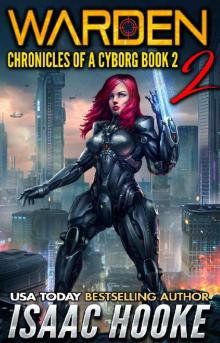 Warden 2
Warden 2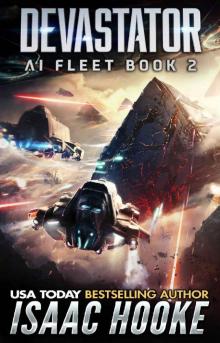 Devastator
Devastator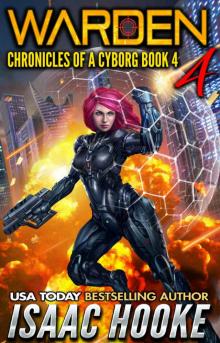 Warden 4
Warden 4 Emperor
Emperor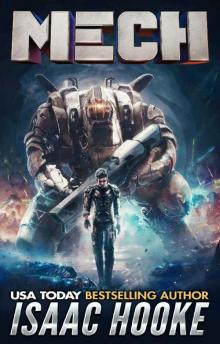 Mech
Mech Conqueror
Conqueror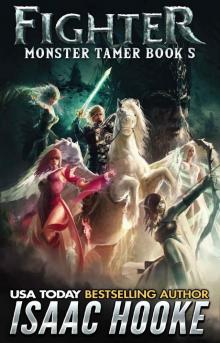 Fighter
Fighter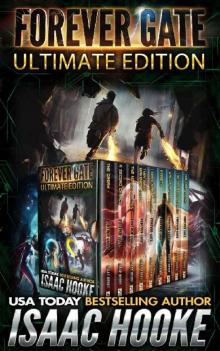 The Forever Gate Ultimate Edition
The Forever Gate Ultimate Edition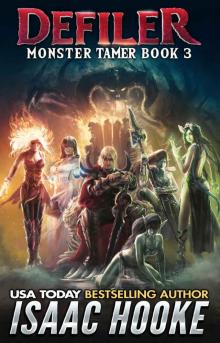 Defiler
Defiler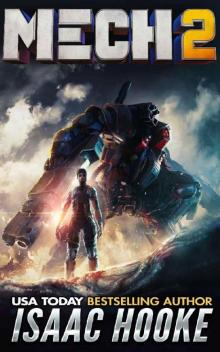 Mech 2
Mech 2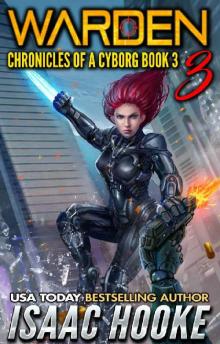 Warden 3
Warden 3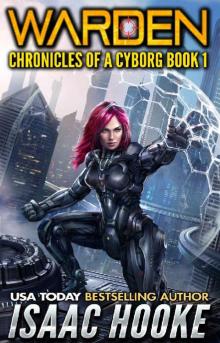 Warden 1
Warden 1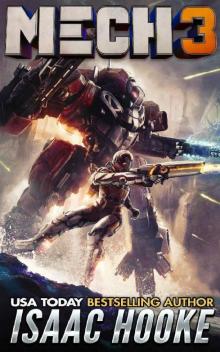 Mech 3
Mech 3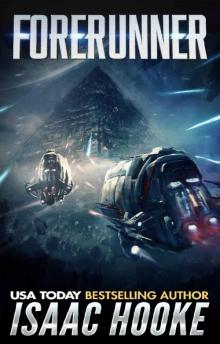 Forerunner
Forerunner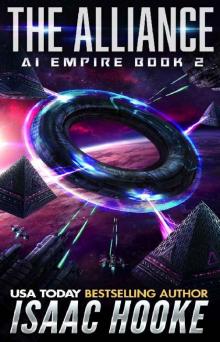 The Alliance (AI Empire Book 2)
The Alliance (AI Empire Book 2)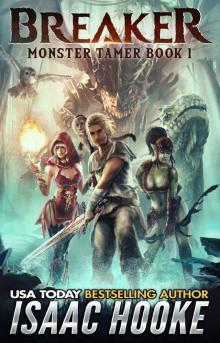 Breaker (Monster Tamer Book 1)
Breaker (Monster Tamer Book 1)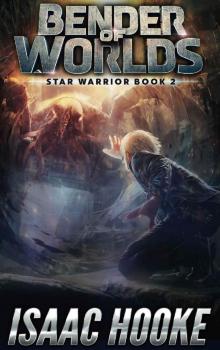 Bender of Worlds
Bender of Worlds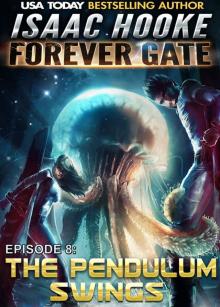 The Pendulum Swings (The Forever Gate Book 8)
The Pendulum Swings (The Forever Gate Book 8)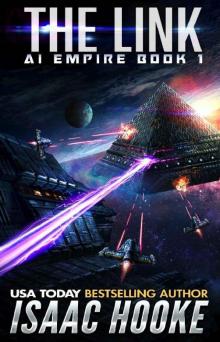 The Link
The Link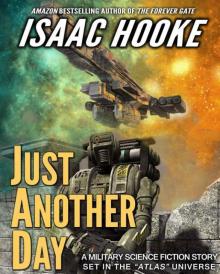 Just Another Day
Just Another Day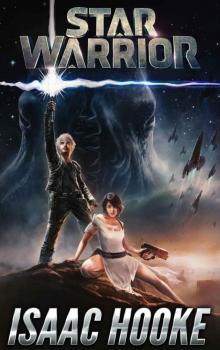 Star Warrior
Star Warrior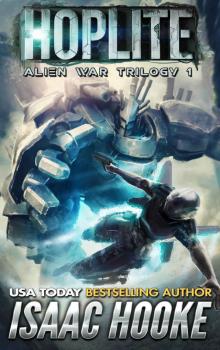 Alien War Trilogy 1: Hoplite
Alien War Trilogy 1: Hoplite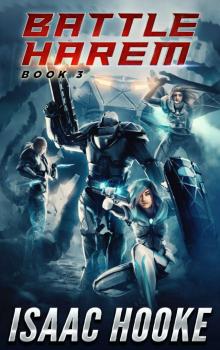 Battle Harem 3
Battle Harem 3 The Ethan Galaal Series: Books 1 - 3
The Ethan Galaal Series: Books 1 - 3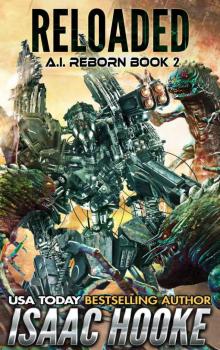 Reloaded
Reloaded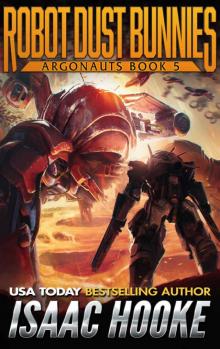 Robot Dust Bunnies (Argonauts Book 5)
Robot Dust Bunnies (Argonauts Book 5) Battle Harem
Battle Harem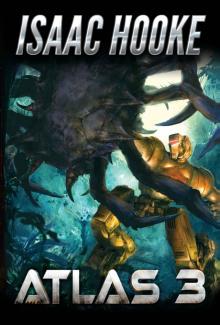 ATLAS 3 (ATLAS Series Book 3)
ATLAS 3 (ATLAS Series Book 3)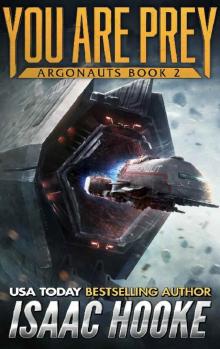 Argonauts 2: You Are Prey
Argonauts 2: You Are Prey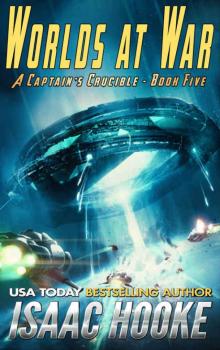 Worlds at War (A Captain's Crucible Book 5)
Worlds at War (A Captain's Crucible Book 5)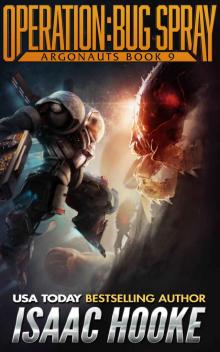 Operation: Bug Spray (Argonauts Book 9)
Operation: Bug Spray (Argonauts Book 9)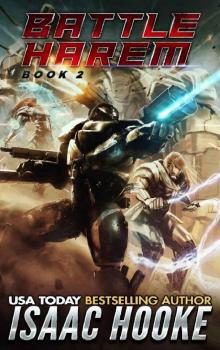 Battle Harem 2
Battle Harem 2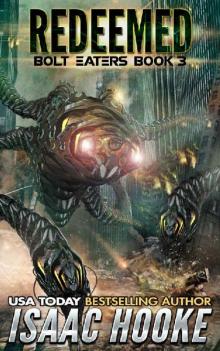 Redeemed (Bolt Eaters Trilogy Book 3)
Redeemed (Bolt Eaters Trilogy Book 3)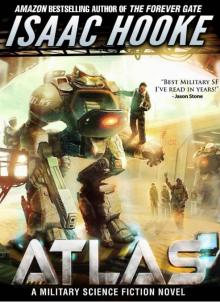 Atlas
Atlas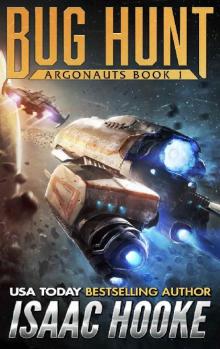 Argonauts 1: Bug Hunt
Argonauts 1: Bug Hunt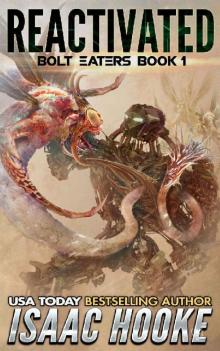 Reactivated (Bolt Eaters Trilogy Book 1)
Reactivated (Bolt Eaters Trilogy Book 1)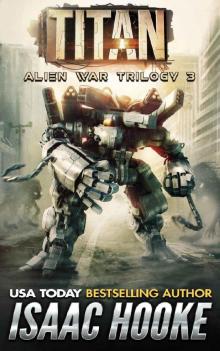 Alien War Trilogy 3: Titan
Alien War Trilogy 3: Titan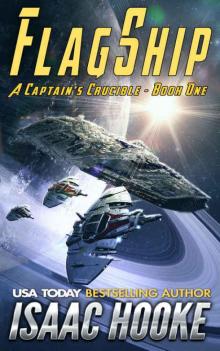 Flagship (A Captain's Crucible #1)
Flagship (A Captain's Crucible #1)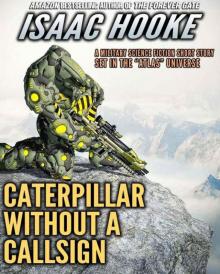 Caterpillar Without A Callsign
Caterpillar Without A Callsign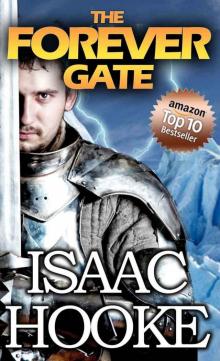 The Forever Gate
The Forever Gate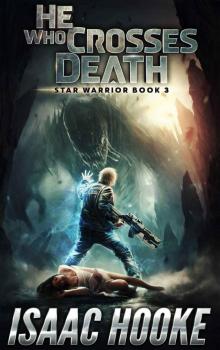 He Who Crosses Death (Star Warrior Quadrilogy Book 3)
He Who Crosses Death (Star Warrior Quadrilogy Book 3)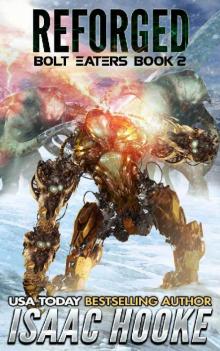 Reforged (Bolt Eaters Trilogy Book 2)
Reforged (Bolt Eaters Trilogy Book 2)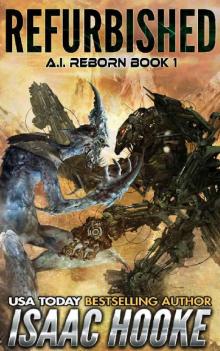 Refurbished
Refurbished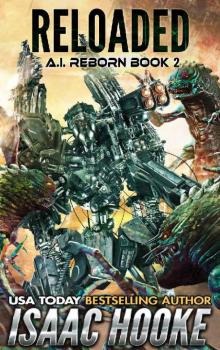 Reloaded (AI Reborn Trilogy Book 2)
Reloaded (AI Reborn Trilogy Book 2)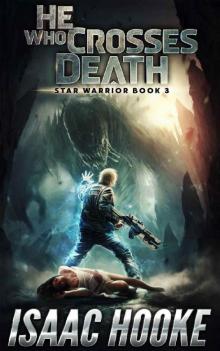 He Who Crosses Death
He Who Crosses Death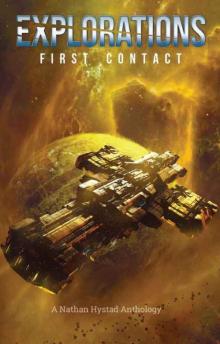 Explorations: First Contact
Explorations: First Contact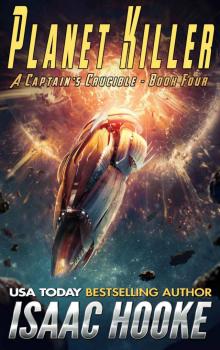 Planet Killer (A Captain's Crucible Book 4)
Planet Killer (A Captain's Crucible Book 4)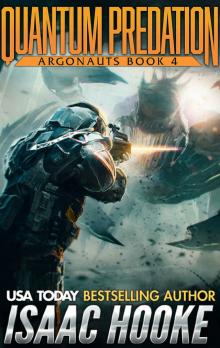 Quantum Predation (Argonauts Book 4)
Quantum Predation (Argonauts Book 4) Clandestine-IsaacHooke-FreeFollowup
Clandestine-IsaacHooke-FreeFollowup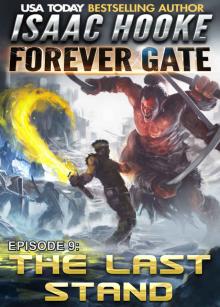 The Last Stand (The Forever Gate Book 9)
The Last Stand (The Forever Gate Book 9)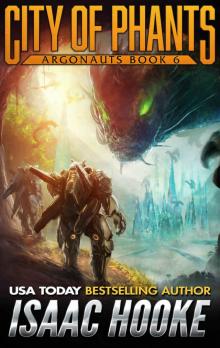 City of Phants (Argonauts Book 6)
City of Phants (Argonauts Book 6)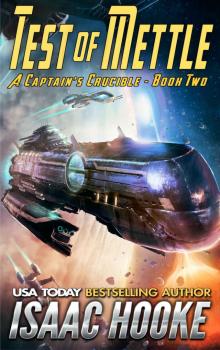 Test of Mettle (A Captain's Crucible Book 2)
Test of Mettle (A Captain's Crucible Book 2)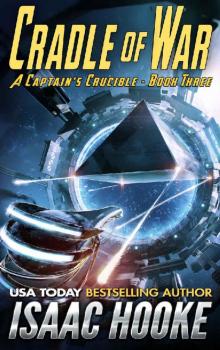 Cradle of War (A Captain's Crucible Book 3)
Cradle of War (A Captain's Crucible Book 3)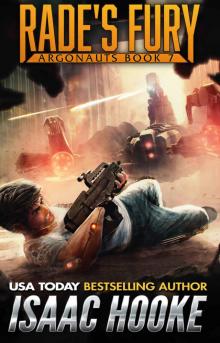 Rade's Fury (Argonauts Book 7)
Rade's Fury (Argonauts Book 7)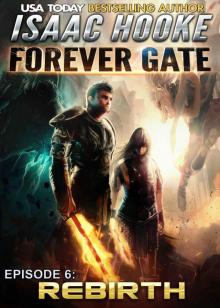 Rebirth (The Forever Gate Book 6)
Rebirth (The Forever Gate Book 6)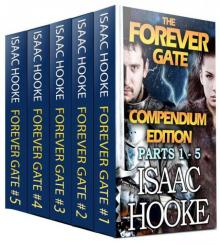 The Forever Gate Compendium Edition
The Forever Gate Compendium Edition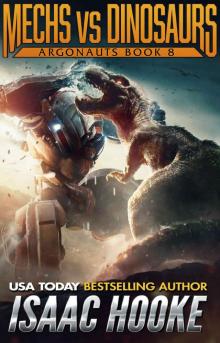 Mechs vs. Dinosaurs (Argonauts Book 8)
Mechs vs. Dinosaurs (Argonauts Book 8)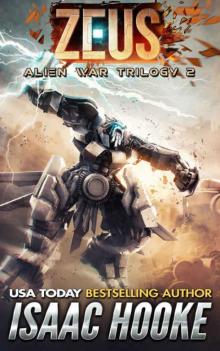 Alien War Trilogy 2: Zeus
Alien War Trilogy 2: Zeus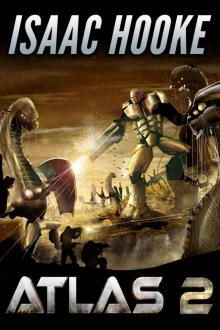 ATLAS 2 (ATLAS Series Book 2)
ATLAS 2 (ATLAS Series Book 2)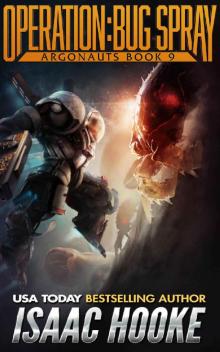 Operation_Bug Spray
Operation_Bug Spray